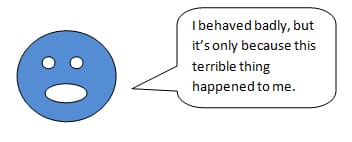Have you ever noticed that we tend to spend a lot of time trying to explain and understand other people’s behavior? For example, when a coworker behaves in a cold or distracted manner, we can’t help but wonder why. We come up with theories and explanations. (Is the coworker an unpleasant person? Is the coworker sick? Has the coworker’s project hit some sort of snag?) We’re always wondering – what’s the motivation behind that person’s behavior? Psychologically speaking, this is known as “attribution.” Attribution is when people try to explain other people’s motives and intentions by observing their behavior.
There are two kinds of attributions that we can make: internal and external.
- Internal attribution – When we believe that the behavior is due to the person’s personality, abilities, or traits. (Bob is acting distracted because he has a tendency to be moody.)
- External attribution – When we believe that behavior is caused by situational or environmental factors that the person has no control over. (Bob is acting distracted because he was unfairly evaluated at work.)
We make attributions because it makes us feel competent and in control. We feel like we know how the world works! And we feel like we can predict behavior.
In truth, however, we often make attribution errors. In fact, we often make what is known as the “fundamental attribution error.” Here’s how this works…
When we explain our own behavior, we take the situation into consideration. We’re kind of charitable with ourselves!
But when we explain other people’s behavior, we often make a fundamental attribution error. We tend to believe that people behave the way they do because of their personality.
So what can you do to avoid making fundamental attribution errors? Try seeing situations from other people’s perspectives. And try to imagine how you would behave if you were in their place. This can help you to identify the external factors that might exist.
And simply recognizing the fact that we all have a tendency to make fundamental attribution errors can help you to avoid making them! This knowledge can help you to become better at observing and understanding other people’s behaviors.









